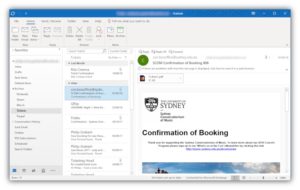- Tackle your toughest task first thing in the morning.Instead of dreading the most difficult task you need to do, try working on this task when you arrive at the office in the morning. This will take the pressure off the rest of your day, making smaller tasks seem easier and more pleasurable to complete.
- Learn from your failures.“It’s fine to celebrate success but it is more important to heed the lessons of failure.” – Bill Gates. The best way to learn is to try, and sometimes when you try you fail. This is not necessarily a bad thing and you should not be afraid to try just because you might fail. In fact, learning from your failures is the best way to improve your work.
- Ask questions.Carl Sagen said, “There are naive questions, tedious questions, ill-phrased questions, questions put after inadequate self-criticism. But every question is a cry to understand the world. There is no such thing as a dumb question.” Successful people learn to think critically and they are inquisitive about their environment. A great tactic to get yourself to start asking questions is to come up with at least one question during meetings. You will learn more about your work and create a good impression by engaging and participating in discussions.
- Focus on one task at a time.Multitasking is the latest business fad and some companies see this as an asset. Being able to multitask is an excellent skill but focusing on one task at a time is far more efficient. Take the necessary time to complete one task correctly. You will find you make fewer mistakes and spend less time correcting unfocused work.
- Solve problems instead of doing the bare minimum.When given a new task, you should ascertain its larger implications. If you understand the greater consequences of the task you can become a problem solver, something that is very valuable.
- Delegate tasks.Successful business leaders enjoy their jobs and love getting into the nitty-gritty with their tasks, but they also know when to pass responsibilities on to others. Learn to let go of some of the tasks you know others can do. This helps your colleagues and employees cope with major tasks in case of your absence.
- Take on more responsibility.Whatever the situation, you must be ready to take on new responsibilities. This will set you apart from your peers. When new opportunities arise you will have more experience than complacent colleagues. When the group is asked for a volunteer to head up a new project or give a presentation, take the risk and raise your hand.
- Wear clothes that speak to your career ambitions.Successful business leaders look the part, their clothes reflect their ambitions and show respect for their current positions. Wearing the correct attire for your job shows your clients, colleagues, and superiors that you are serious about what you are doing. Wearing the attire of the job you want shows your superiors you are serious in your ambition for a higher position.
- Use your product.When possible, use the product or service your company sells. This is an interesting way to learn about your customers’ experience with your product.
- Say no sometimes.Not every task or responsibility that comes along is the right thing to do. Being able to say no to certain things allows you to focus on the things that help your career. As Tony Blair said, “The art of leadership is saying no, not yes. It is very easy to say yes.” You should try to say no to certain tasks (when you have the choice). This could be when you have a very important decision in your career, such as a job offer from a competitor, or it might be something trivial, like having lunch with a colleague.
- Don’t be a perfectionist.Being accurate and thorough leads to success but poring over minutiae does not. Obsession with perfection slows you down and makes you less productive. Learn to accept some level of imperfection in your work.
- Practice.Successful business leaders practice more than their peers. When you have an upcoming presentation, you’ll feel more comfortable and confident if you’ve taken the time to practice as often as possible.
- Stay focused for an hour, then relax for fifteen minutes.This segmented work/break structure is optimal for thorough and accurate work. Our minds can only focus on a task for a short amount of time. Trying to work four hours straight will just slow you down and render you ineffective. If you have shorter, more productive work segments, you can expect better results and a clearer mind.
- Employ Brain DumpingWhen you are confronted with a task, be sure to write it down so you don’t need to store it in your head. This will free your mind so you can focus on other matters. You will be at ease because you won’t have to constantly think “am I forgetting something.”

- Leave time for unexpected projects or tasks.Successful business leaders expect the unexpected and are ready to perform at their best when something unplanned comes along. Be sure to set aside some time to take care of things you didn’t have scheduled. This ensures that you handle the unexpected just as effectively as you handle the expected.
- If you can’t finish something, learn to live with it.Assign as much time as possible to the things that you need to do, but accept that you will not get everything done. Always finishing everything you are assigned is impossible and you should learn to accept this or risk burning out. Remember, overwork can be dangerous. Just look at the extremely hardworking culture of Japan where their word “Karoshi” literally translates to “death from overwork.”
- Organize your projects with action plans.When you are assigned a project, write down the steps it will take to finish it. Use this as a guide as you tackle the problems associated with it.
- Look over what you have done at the end of the week.Instead of just looking ahead in your planner, look back at what you have done during the week. This is useful for finding out where you were inefficient and can be beneficial for improving your performance.
- Find ways to do your routine tasks more efficiently.Certain daily and weekly tasks at the office eventually become so routine that you could almost do them in your sleep. Instead of continuing to do these tasks in the manner you always do, try changing your methods every once in a while and find more efficient ways to work.
- Keep your desk organized.A cluttered desk is a cluttered mind. Keeping too much unorganized stuff on your desk is proven to decrease your productivity. Before you leave work every day, try organizing your desk, throw away any garbage, clean any messes, and put your paperwork in its proper filing area.
- Label the files in your desk.Have a system in place that is easy for you to use and easy for others to navigate. You never know when your boss might have to look for something when you’re not there, and being organized will reflect well on you.
- Find documents on your desktop quickly.Being able to quickly find documents on your desktop increases your productivity. You can try creating a filing system of your own, or download one of many automated desktop organizers.
- Keep your inbox organized.Losing an important email could be potentially devastating to your career. A lost email from a client with an important attachment might sully a major deal. For some, the abovementioned filing system will help keep email at bay. For others, filing seems like a waste of time and effort. If you’re one of these, you could try downloading an email search tool to make sure you never lose an important email again.
- Minimize interruptions.Having a few interruptions in the workplace is natural but you can minimize them. Nobody is totally focused, but there are ways you can take control at work, like not staying logged in to your social media sites or turning your mobile phone off.
- Work hard, until you feel it.The saying “no pain, no gain” often refers to athletic activity, but researching, practicing, writing, editing, organizing, and other mental work is also very taxing. Working until you actually feel it is the best policy, this trains your mind to expect to work hard when you start a task.
- Stay late at work.If you are staring at the clock towards the end of the day, you are doing something wrong. Try thinking about the end of the workday as the end of the tasks you set out to accomplish.
- Network.The modern business environment encourages you to pursue career goals wherever they may be. A healthy social circle can be employed for networking both inside and outside of your current company. Research shows that 80% of new jobs are landed through networking. Be open with your friends and family about your ambitions, most people want to help you succeed and will uncover new opportunities to you.
- Sell your strengths and accomplishments.When you are asked what it is you have done in your career, have some things to list. Make this your quick introduction speech and get good at delivering it.
- Find likeminded and ambitious friends.Successful business leaders keep like-minded associates because they know that the company they keep affects their own successes. When you start a new job, you should try and find colleagues who share the same values as you do. You will find that these people can be a positive influence on your career and will increase your chances of reaching your potential.
- Use proper greetings and salutations.Whether this is in an email or in-person, you should try to uphold the cultural norms for polite behavior. Try spending a few minutes each day greeting colleagues and making them feel like a part of your social circle.
- Smile as much as possible.Smiling radiates positivity and people like being around you when you smile. Colleagues will be more likely to help you with important tasks if they see you as a positive person.
- Be honest.Being honest with your colleagues will give you credibility. As a supervisor, your employees must be able to trust that you are looking out for their best interests, and being honest with them helps you gain this trust. As a subordinate you must show your supervisors that you are dependable and can be trusted. Having a policy of being honest, even when it reflects badly on you, is the first step in showing your dependability.
- Remain humble.Great business leaders are able to own up to their mistakes. Humility, similarly to honesty, encourages others to trust you. If you are modest about your successes, and open about your failures, you will not only demonstrate integrity in your work, but set an example to those around you. Being humble also enables you to reflect on your errors so you can figure out how to improve your work.
- Find a great mentor.Great business leaders didn’t become successful on their own. Many of them had excellent mentors to guide them in their ambitions. A mentor can give you great advice when you are at important points in your career. You can’t choose your own mentor but you can find someone who resembles who you want to be in the future. You should be able to trust your mentor and they should be generous with their advice.
- Learn from others.Whether it be colleagues, superiors, family, friends, or historical figures, you should try and learn from the successes or failures of others. There is a great deal you can learn from others, especially those who’ve been through similar experiences.
- Discuss ideas with colleagues and acquaintances.If there is a new product, policy, or procedure, try asking your colleagues what they think about it. This will give you insight into another point of view that you might not have considered and may prove valuable in the future.
- Help others solve problems.You should try not to be selfish with your time and make an effort to help your colleagues when they’re stuck on a problem. Helping others solve problems teaches you valuable teambuilding and problem solving skills and can give you a great sense of satisfaction. Gaining the admiration of your colleagues is prudent, and the next time you are stuck on a problem your colleagues might be there to help you.

- Help colleagues succeed at their goals.Rivalries can create tunnel vision that gets in the way of mutually beneficial cooperation in the workplace. You should try not to fall prey to unhealthy competition, since most of the time you are not in direct competition with colleagues. Helping a colleague succeed will not only benefit them, and team or departmental goals, but also make them more likely to help you when you need it.
- Compliment others.Noticing and remarking on your colleagues’ or employees’ accomplishments goes a long way. They will appreciate your compliment, and when people and their work are valued, their satisfaction and productivity rises. As Charles Schwab said, “I consider my ability to arouse enthusiasm among men the greatest asset I possess. The way to develop the best that is in a man is by appreciation and encouragement.”
- Communicate well with your colleagues.Learn how to deal with all of the personalities at work, even the difficult ones. Find ways to, at the very least, communicate effectively with your colleagues.
- Forgive rivals.Mahatma Gandhi said “The weak can never forgive. Forgiveness is the attribute of the strong.” When you clash with colleagues at work, it can often get a little ugly. Be the first person to make peace and you may find an ally who works with you rather than a rival who works against you.
- Make long term plans.Business leaders are methodical in their planning. Their plans aren’t just for a month or even a year, successful business leaders have an idea of what they will be doing decades in advance. Jack Welch said that “Management is all about managing in the short term, while developing the plans for the long term.” Take some time at every step of your career to make long term plans.
- Write down your goals. It may seem trivial, but actually taking the time to write down your goals is very important. When you write down your thoughts you are better able to organize and analyze them. This should give you a more realistic view of your ambitions.
- Set boundaries for yourself.Having dreams is healthy but you should try to ground them in reality. Someone who is tall should not expect to be a horse jockey and someone short should not expect to be a professional basketball player. Try having goals that are within the boundaries of your talents, not just your interests.
- Don’t take a job for the salary.Taking a position for the salary is never a good idea and might even result in less lifetime earnings. Doing something because you have the talent and interest can actually increase your lifetime earnings. Warren Buffett said “In the world of business, the people who are most successful are those who are doing what they love.”
- Track your progress.Completing a goal is difficult but tracking your progress makes it more likely that you will see it through. Make note of the major acheivements along your way to finishing a task.
- Embrace change.Nothing happens without change, you must learn to work with it or be forced out of an ever-changing market. Bill Clinton said, “The price of doing the same old thing is far higher than the price of change.” Next time a change comes up at the office, try to see it as a positive thing, not only for your department or company but also for you. Learning how to embrace change in your career is a great way to progress.
- Don’t procrastinate.Procrastination breeds hurried, less than optimal work, and can force errors that wouldn’t have been made had you not procrastinated. Next time an important task comes along, try starting it immediately. The most difficult step in any journey is the first.
- Don’t get overwhelmed.The amount of work we have to do can overpower us sometimes. We think of one thing we need to do then another until we can’t think straight. A good technique to control this is taking every day one day at a time and not worrying about the next one. This is especially helpful when we have long stretches of time with packed schedules.
- Envision your successes.Visualizing where you want to be in your career enables you to forge paths to get there. Taking time to think about where you want to end up will help you see what you need to do to make it there.
- Take risks.Mark Zuckerberg said “The biggest risk is not taking any risk… In a world that is changing really quickly, the only strategy that is guaranteed to fail is not taking risks.” You will be presented with choices during your career and sometimes you will need to choose between stability and uncertainty. Remember, choosing uncertainty will not always pay off, but choosing stability can lead to regret.
- Be passionate.Successful business leaders exude passion. That is because they are doing something that they are passionate about. R. Rahman said, “Success comes to those who dedicate everything to their passion in life.” When you decide on your career path you should try and do something that you have a passion for and keeps you energized.
- Listen to your inner voice.Everyone has an inner voice that serves as a moral or rational guide in times where we are preoccupied by other forces. Learn to listen to this voice more often and you will make better decisions.
- Be persistent.Bill Bradley said, “Ambition is the path to success. Persistence is the vehicle you arrive in.” Successful people don’t take no for an answer and when they fail they try again. Next time you hear the word “no,” make a second effort before giving up.

- Be specific in your goals.Being too general in what you want to achieve is not as helpful as having more specific goals. Simply stating “I want to succeed at work” is not very useful. Try making more specific goals that have some sort of timeline like “I want to be the department head in 3 years” or “I want to take on 5 new clients by next quarter.”
- Do things that you aren’t sure you’ll succeed at.Taking the path of least resistance is the easiest way to approach your career but not the best. Opportunities arise and often you are uncertain whether or not you will succeed in doing them. In some cases, you are all but certain that you will encounter at least some degree of failure along the way to completing the task. You need to accept this amount of failure or accept the prospect that you might fail altogether. Accepting failure will allow you to take on the necessary challenges that lead you to your career goals.
- When you fail, try again.History is full of stories about successful people failing and feeling distraught. Their stories are not about how they failed but how they got back up again to succeed. When you are feeling down and you failed at a task, just remember that failure is only as temporary as you want it to be. The fallout from failure can be quick or it can last a lifetime, the choice is mostly up to you.
- Get out of your comfort zone.Generally speaking, your success happens outside of your comfort zone. Everyone has things they don’t feel comfortable doing, like public speaking, networking, writing, or taking business trips. Remember, the more you shy away from something, the harder it becomes in the future.
- Invest in yourself.The best investment you can make is in your career. Use free time and money for education, such as an MBA or computer certifications.
- Strike a good work/life balance.Walt Disney once said “A man should never neglect his family for business,” something we should keep in mind as we approach our careers. Try and take some time for yourself and your family when you are away from the office. Your performance at work will improve as a result.
- Exercise regularly.Regular exercise gives you the energy and stamina to complete the most challenging assignments you undertake. Exercise does not need to be very time consuming and you can easily fit it into your busy schedule. New research suggests that short vigorous exercise is better for your health than hours of moderate exercise. Thirty minutes of intense exercise will leave you energized and focused.
- Eat well.Taking the easy way (fast food, candy bars) when it comes to eating is never the best way and will catch up to you by the end of the day. A lot of what you need to know about healthy delicious foods is at your fingertips, and with a little knowledge you can find foods that keep you energized throughout the workday. There are many tasty, healthy, fast, and easy recipes out there. Try checking out a nutrition website to get started on better eating.
- Stick to healthy routines.Once you have healthy routines, you should take care to preserve them. Whether this is sleeping, exercising, or eating, maintaining good routines in and out of the office is important for a successful career.
- Learn constantly.Steve Jobs said, “Learn continually, there is always one more thing to learn.” There are many opportunities to learn new things at the office and you should try and take advantage of them. Next time you are given a task, try doing some research first and learn as much as you can about it.
- Keep your mind occupied.When you are not at the office, you should try and find ways to keep your mind occupied with different engaging activities. Reading a book, taking up an instrument, or learning a new language are great ideas for this. They will keep your mind in great shape for the challenges of the workplace.
- Wake up a few hours before work.The saying Benjamin Franklin coined – “early to bed early to rise makes a man healthy, wealthy, and wise” – is still relevant today. Scientists have now proven that this is the healthiest way to live. The most productive part of our day is a couple of hours after we wake up, so make sure that this time is right when you arrive at the office in the morning. If you slide out of bed and arrive at work barely in time, you need an hour or so to really get started. Try getting up an hour earlier than usual and use this time to exercise, read, or have a healthy breakfast.
- Be generous with your knowledge.Generosity is very healthy, it drives you to mentor and be a great parent, teacher, or manager. Being generous with your knowledge will make you a better colleague, subordinate, and superior.
- Stay centered.Mindfulness practices are in style with business leaders because there are legitimate benefits to them. Keeping an emotional and mental center during the workday is a great way to stay clear and level. Take a fifteen minute break to sit quietly, breathe slowly, and think only about the present. You will leave feeling refreshed and more focused.

- Seize the day.Theodore Roosevelt once said “Get action. Seize the moment. Man was never intended to become an oyster.” Make every day count and don’t be lazy. Maximize each workday and do the same the next day.
- Think positively.Being positive gives you self-confidence and guides you away from the despair that often ruins careers. When your career is faced with a setback, try finding the good in it rather than focusing only on the negative.
- Vary your experiences.Having the same experiences as your peers will not make you stand out, and when it comes time for a promotion you will have nothing to set yourself apart. Varying your experiences is also important for your ideas. If you have the same experiences as your colleagues you will probably come up with similar ideas, but when you have unique experiences you will also have unique ideas.
- Learn self-control.Having self-control at the office is just as important as having it in your personal life. Next time you are tempted to chat with a colleague or surf the web try to do something productive instead.
- Hire people to help.Successful business leaders are able to focus on their work because somebody else is helping them out. They have nannies, housekeepers, landscapers, plumbers, mechanics, handymen, and even personal chefs. Successful people recognize that they’re not experts in everything, finding the right people for the right job can be a big help.
- Be frugal but spend money when necessary.Spending money on the right things is key to achieving your business goals. Buying equipment and clothes for your job are great examples of things you should invest in.
- Show up!Woody Allen once said, “80% of success is showing up.” Don’t feel like going to work in the morning? Or do you want to skip out on that conference over the weekend? Think twice, these are common mistakes that could seriously jeopardize your career.
As you can see, there are many ways to boost productivity and keep your career on track. What do you do to stay productive? Let us know in the comments below!



it is very nice but is that possible to add more?
thank you
Sure, what did you have in mind?